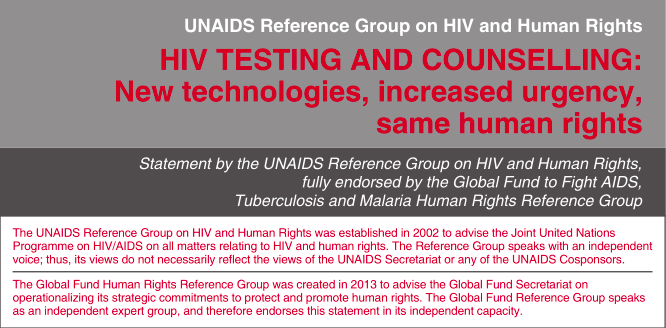
The UNAIDS Reference Group on HIV and Human Rights has updated its statement on HIV testing — which continues to emphasise that human rights, including the right to informed consent and confidentiality, not be sacrifced in the pursuit of 90-90-90 treatment targets — in the light of “three key trends that have emerged since the last statement regarding HIV testing was issued by the UNAIDS Reference Group (in 2007).”
One of these is “prolific unjust criminal laws and prosecutions, including the criminalization of HIV non-disclosure, exposure, and transmission.” The other two involve the recognition that HIV treatment is also prevention, and policies that aim to “end the AIDS epidemic as a public health threat by 2030.”
This statement is an important policy document that can be used to argue that public health goals and human rights goals are not mutually exclusive.
The Reference Group was established in 2002 to advise the Joint United Nations Programme on HIV/AIDS (UNAIDS) on all matters relating to HIV and human rights. It is also fully endorsed by by the Global Fund to Fight AIDS, Tuberculosis and Malaria Human Rights Reference Group.
This statement is issued at a time when UNAIDS and the Global Fund are renewing their strategies for 2016–2021 and 2017–2021, respectively.
To support these processes, the Reference Groups offer the following three key messages:
1. There is an ongoing, urgent need to increase access to HIV testing and counselling, as testing rates remain low in many settings. The Reference Groups support such efforts unequivocally and encourage the provision of multiple HIV testing settings and modalities, in particular those that integrate HIV testing with other services.
2. Simply increasing the number of people tested, and/or the number of times people test, is not enough, for many reasons. Much greater efforts need to be devoted to removing barriers to testing or marginalized and criminalized populations, and to link those tested with prevention and treatment services and successfully keep them in treatment.
3. Public health objectives and human rights principles are not mutually exclusive. HIV testing that violates human rights is not the solution. A “fast-track” response to HIV depends on the articulation of testing and counselling models that drastically increase use of HIV testing, prevention, treatment, and support services, and does so in ways that foster human rights protection, reduce stigma and discrimination, and encourage the sustained and supported engagement of those directly affected by HIV.
The section on HIV criminalisation is quoted below.
The criminalization of HIV non-disclosure, exposure, and transmission is not a new phenomenon, but the vigour with which governments have pursued criminal responses to alleged HIV exposures — at the same time as our understanding of HIV prevention and treatment has greatly advanced, and despite evidence that criminalization is not an effective public health response — causes considerable concern to HIV and human right advocates. In the last decade, many countries have enacted HIV-specifc laws that allow for overly broad criminalization of HIV non-disclosure, exposure, and transmission. This impetus seems to be “driven by the wish to respond to concerns about the ongoing rapid spread of HIV in many countries, coupled by what is perceived to be a failure of existing HIV prevention efforts.” In some instances, particularly in Africa, these laws have come about as a response to women being infected with HIV through sexual violence, or by partners who had not disclosed their HIV status.
Emerging evidence confrms the multiple implications of the criminalization of HIV non-disclosure, exposure, and transmission for HIV testing and counselling. For example, HIV criminalization can have the effect of deterring some people from getting tested and finding out their HIV status. The possibility of prosecution, alongside the intense stigma fuelled by criminalization, is good reason for some to withhold information from service providers or to avoid prevention services, HIV testing, and/or treatment. Indeed, in jurisdictions with HIV-specific criminal laws, HIV testing counsellors are often obliged to caution people that getting an HIV test will expose them to criminal liability if they find out they are HIV-positive and continue having sex. They may also be forced to provide evidence of a person’s HIV status in a criminal trial. This creates distrust in relationships between people living with HIV and their health care providers, interfering with the delivery of quality health care and frustrating efforts to encourage people to come forward for testing.
The full statement, with references, can be downloaded here and is embedded below.
HIV TESTING AND COUNSELLING: New technologies, increased urgency, same human rights